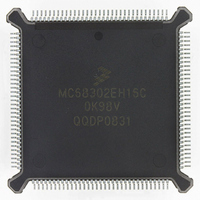MC68302EH16C Freescale Semiconductor, MC68302EH16C Datasheet - Page 58

MC68302EH16C
Manufacturer Part Number
MC68302EH16C
Description
IC MPU MULTI-PROTOCOL 132-PQFP
Manufacturer
Freescale Semiconductor
Datasheets
1.MC68302AG20C.pdf
(4 pages)
2.MC68302AG20C.pdf
(2 pages)
3.MC68302AG20C.pdf
(13 pages)
4.MC68302EH16C.pdf
(481 pages)
Specifications of MC68302EH16C
Processor Type
M683xx 32-Bit
Speed
16MHz
Voltage
5V
Mounting Type
Surface Mount
Package / Case
132-MQFP, 132-PQFP
Controller Family/series
68K
Core Size
32 Bit
Ram Memory Size
1152Byte
Cpu Speed
16MHz
No. Of Timers
3
Embedded Interface Type
SCP, TDM
Digital Ic Case Style
PQFP
Rohs Compliant
Yes
Family Name
M68000
Device Core
ColdFire
Device Core Size
32b
Frequency (max)
16MHz
Instruction Set Architecture
RISC
Supply Voltage 1 (typ)
5V
Operating Temp Range
0C to 70C
Operating Temperature Classification
Commercial
Mounting
Surface Mount
Pin Count
132
Package Type
PQFP
Lead Free Status / RoHS Status
Lead free / RoHS Compliant
Features
-
Lead Free Status / Rohs Status
RoHS Compliant part
Electrostatic Device
Available stocks
Company
Part Number
Manufacturer
Quantity
Price
Company:
Part Number:
MC68302EH16C
Manufacturer:
Freescale Semiconductor
Quantity:
135
Company:
Part Number:
MC68302EH16C
Manufacturer:
PANA
Quantity:
99
Company:
Part Number:
MC68302EH16C
Manufacturer:
Freescale Semiconductor
Quantity:
10 000
Part Number:
MC68302EH16C
Manufacturer:
FREESCALE
Quantity:
20 000
Company:
Part Number:
MC68302EH16CB1
Manufacturer:
Freescale Semiconductor
Quantity:
10 000
Company:
Part Number:
MC68302EH16CR2
Manufacturer:
Freescale Semiconductor
Quantity:
10 000
- MC68302AG20C PDF datasheet
- MC68302AG20C PDF datasheet #2
- MC68302AG20C PDF datasheet #3
- MC68302EH16C PDF datasheet #4
- Current page: 58 of 481
- Download datasheet (2Mb)
System Integration Block (SIB)
DNS—Done Not Synchronized
BES—Bus Error Source
BED—Bus Error Destination
DONE—Normal Channel Transfer Done
3.1.3 Interface Signals
The IDMA channel has three dedicated control signals: DMA request (DREQ), DMA ac-
knowledge (DACK), and end of IDMA transfer (DONE). The IDMA’s use of the bus arbitra-
tion signals is described in 3.1.6 DMA Bus Arbitration. The peripheral used with these
signals may be either a source or a destination of the transfers.
3.1.3.1 DREQ and DACK
These are handshake signals between the peripheral requiring service and the IMP. When
the peripheral requires IDMA service, it asserts DREQ, and the IMP begins the IDMA pro-
cess. When the IDMA service is in progress, DACK is asserted during accesses to the de-
vice. These signals are not used when the IDMA is programmed to internal request modes.
3.1.3.2 DONE
This bidirectional signal is used to indicate the last IDMA transfer. With internal request
modes, the IDMA activates DONE as an output during the last IDMA bus cycle. If DONE is
externally asserted during internal request modes, the IDMA transfer is terminated. With ex-
ternal request modes, DONE may be used as an input to the IDMA controller indicating that
the device being serviced requires no more transfers and that the transmission is to be ter-
minated. DONE is an output if the transfer count is exhausted.
3-8
This bit is set if operand packing is performed between 16-bit memory and an 8-bit periph-
eral and the DONE signal is asserted as an input to the IDMA (i.e., by the peripheral) dur-
ing the first access of the 8-bit peripheral. In such a case, the IDMA will still attempt to
finish the second access of the 8-bit peripheral even though DONE has been asserted
(the access could be blocked with external logic); however, the DNS bit will be set to sig-
nify this condition. DNS will not be set if the transfer is terminated by an odd byte count,
since, in this case, the exact number of requested bytes will be transferred by the IDMA.
This bit indicates that the IDMA channel terminated with an error returned during the read
cycle. The channel terminates the IDMA operation without setting DONE. BES is cleared
by writing a one or by setting RST in the CMR. Writing a zero has no effect on BES.
This bit indicates that the IDMA channel terminated with an error during the write cycle.
The channel terminates the IDMA operation without setting DONE. BED is cleared by writ-
ing a one or by setting RST in the CMR. Writing a zero has no effect on BED.
This bit indicates that the IDMA channel has terminated normally. Normal channel termi-
nation is defined as 1) having decremented the BCR to zero with no errors occurring dur-
ing any IDMA transfer bus cycle or 2) by the external peripheral asserting DONE with no
errors occurring during any IDMA transfer bus cycle. DONE will not be set if the channel
terminates due to an error. DONE is cleared by writing a one or by a software RST in the
CMR. Writing a zero has no effect on this bit.
MC68302 USER’S MANUAL
MOTOROLA
Related parts for MC68302EH16C
Image
Part Number
Description
Manufacturer
Datasheet
Request
R
Part Number:
Description:
Manufacturer:
Freescale Semiconductor, Inc
Datasheet:

Part Number:
Description:
MC68302 Configuring the Chip Selects on the MC68302
Manufacturer:
Motorola / Freescale Semiconductor

Part Number:
Description:
MC68302 Design Concept - Expanding Interrupts on the MC68302
Manufacturer:
Motorola / Freescale Semiconductor

Part Number:
Description:
MC68302 MC68302 Adapting a WAN Controller to a LAN Environment
Manufacturer:
Motorola / Freescale Semiconductor

Part Number:
Description:
MC68302 EKB Applications - Power Measurements on the MC68302
Manufacturer:
Motorola / Freescale Semiconductor

Part Number:
Description:
MC68302 Interfacing the MC68020 to a Slave MC68302
Manufacturer:
Motorola / Freescale Semiconductor

Part Number:
Description:
MC68302 MC68302 Software Performance
Manufacturer:
Motorola / Freescale Semiconductor

Part Number:
Description:
MC68302 Evaluating EDX on the ADS302
Manufacturer:
Motorola / Freescale Semiconductor

Part Number:
Description:
MC68302 Design Advisory #1 - MC68SC302 Passive ISDN Protocol Engine
Manufacturer:
Motorola / Freescale Semiconductor

Part Number:
Description:
MC68302, MC68360, and MPC860 Characteristics and Design Notes for Crystal Feedback Oscillators
Manufacturer:
Motorola / Freescale Semiconductor
Part Number:
Description:
Mc68302 Integrated Multi-protocol Processor
Manufacturer:
Freescale Semiconductor, Inc
Datasheet:
Part Number:
Description:
Manufacturer:
Freescale Semiconductor, Inc
Datasheet:
Part Number:
Description:
Manufacturer:
Freescale Semiconductor, Inc
Datasheet:
Part Number:
Description:
Manufacturer:
Freescale Semiconductor, Inc
Datasheet:
Part Number:
Description:
Manufacturer:
Freescale Semiconductor, Inc
Datasheet:











